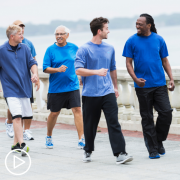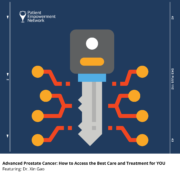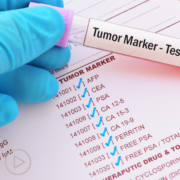How to Locate Prostate Cancer Clinical Trials and Improve Awareness
How to Locate Prostate Cancer Clinical Trials and Improve Awareness from Patient Empowerment Network on Vimeo.
How is prostate cancer impact different for some populations? Watch as experts Dr. Yaw Nyame and Sherea Cary share the benefits of clinical trials, reliable clinical trial resources, and how clinical trial participation rates can be improved for better care.
See More From Best Prostate Cancer Care No Matter Where You Live
Related Resources:

|
Transcript:
Sherea Cary:
What advice do you have for prostate cancer patients about locating a clinical trial? Where can you find one?
Dr. Nyame:
Clinical trials tend to happen at the big cancer centers and the big academic university centers, although many of those programs will have affiliate partners out in the community. The easiest way to learn about clinical trials is to start by asking the physician that’s treating you for your prostate cancer, oftentimes, they’ll have resources and connections to the trials directly or are the people who are administering them. However, other great sources are going to be patient advocacy networks, and there are many of them for prostate cancer, there’s one…there are several. I’ll start naming a few. They have the Prostate Cancer Foundation, you have Us TOO, you have Zero Cancer, you have a PHEN, Prostate Health Education Network, which is an advocacy group for Black men with prostate cancer. So, these are all great sources of finding out what clinical trials exist, and in addition, you can just get on the Internet and Google if that’s something you have access to. The trick is navigating all the information, and I think knowing what trials are available for you, whether you qualify, that kind of thing can be difficult, and that’s ultimately where finding a provider, whether it’s your direct urologists or radiation oncologist or whoever is helping treat your prostate cancer, either them directly or sometimes seeking a second opinion, and going to a place where you might find someone who has some expertise in trials, if that’s something that you’re interested in.
Sherea Cary:
My father participated in a clinical trial, it was going on, I think the time of his treatment, and it was offered to us, and he was at a big facility here in Houston that offered…ask him if he wanted to participate. We did a lot of research. We said we’d try it. And we were glad to be able to participate. I participated in clinical trials also for different health conditions, because I believe it’s important that we have to participate in order for our people to gather the information that’s necessary. So, thank you for that.
Dr. Nyame:
Absolutely, you know I think there are a lot of reasons that we think that our Black community, for instance, may not participate in a clinical trial given the history of medical experimentation and various forms of abuse that have existed in our history. But what I recently heard from our partner of our community partners at PHEN, when they surveyed Black men about prostate cancer clinical trials, was that although there was some concern about trust in the history, that the overwhelming majority of the men wanted to participate, but they never were asked. And that’s really stuck with me, and I think that Black men are under-represented in clinical trials, and we have to find ways to be more inclusive and understand what barriers might exist into participation so that we can have that data to care better for the population.












